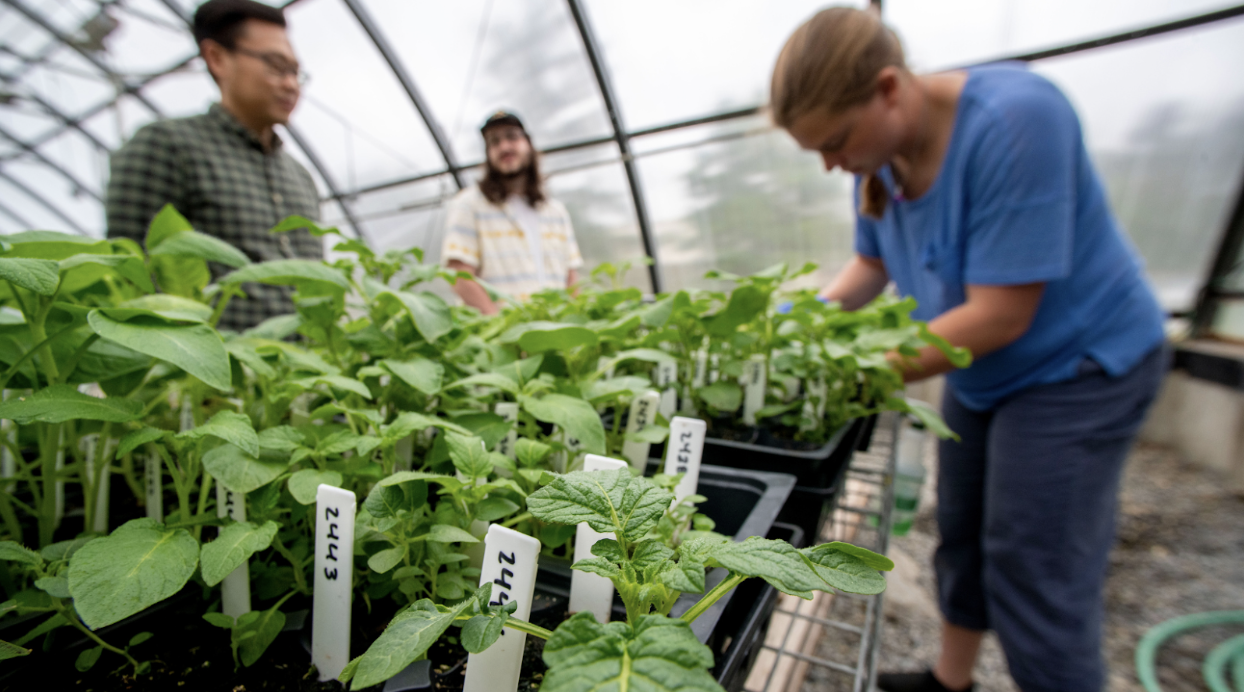
The University of Maine is Among Six Universities Awarded $1.4 million to Breed and Develop Resilient Potato Varieties
When it comes to potato crops, their resilience and their adaptability to changing climates is crucial. The University of Maine (UMaine) alongside six other Eastern U.S. universities were recently awarded a $1.4 million U.S. Department of Agriculture (USDA) grant titled “Special Research Grants Program: Potato Research,” to conduct research surrounding the development of abiotic (environmental) and biotic (disease-related) resistant potato varieties. Mario Andrade, Assistant Professor in Plant Genetics and Breeding at the University of Maine, researches and develops potato varieties that can withstand changing climatic conditions for years to come. Potato breeding and crop resilience research plays a vital role in ensuring that this versatile vegetable continuously thrives, even in challenging conditions.
The USDA Grant includes the University of Maine, University of Florida, North Carolina State University, Penn State University, Cornell University, Virginia Tech, and Ohio State University, an interconnected series of Eastern U.S. universities with unique potato breeding programs and research related to the development of potato varieties.
Andrade, who joined UMaine in April, began his research on potato crops in Brazil, a country that has a vastly different climate related to Maine and other Eastern U.S. states. “Heat tolerance was the main focus of the lab where I was working back in Brazil, as the slightest shifts in temperature can destroy an entire crop yield,” Andrade noted.
The potato industry faces both abiotic and biotic stresses, and Andrade’s research background is essential to addressing these challenges for potato crops in Maine. He specifically highlighted the differences in potato cultivation between Florida and Maine, where their climates and growing seasons contrast. “The climate is vastly different between Florida and Maine. In Florida, potatoes are planted in the winter and harvested in the spring. In Maine, it is the opposite, where potatoes are planted in spring and harvested in Fall,” Andrade explained. The stark difference in growing seasons highlights the need for potato varieties that can adapt and grow in a variety of climates.
The research project focused on enhancing the resilience of potato varieties in the Eastern United States has the objective of plant breeding to improve the adaptability of crops to various environments. In this project specifically, the research team is trying to breed potatoes that thrive in Eastern U.S. conditions, From Maine to Florida, while facing both abiotic and biotic stresses.
The ultimate goal of the project is to find resilient potato varieties, specifically suited to the Eastern United States. To achieve this, the breeding programs assess each plant’s performance, looking for characteristics such as high yield, disease resistance, and environmental adaptability. Andrade highlights the collaborative nature of the project, involving seven states and five breeding programs. Each program generates thousands of potato plants per year, and the collaborative effort is aimed at testing potatoes across a range of environments to study their adaptability in changing climates.
Andrade and team utilize various innovative techniques to streamline the breeding process, with a promising approach utilizing genomic selection. Andrade explained, “With genomic selection, we can extract the DNA of each plant and use thousands of DNA markers to predict the plant’s performance without needing to grow the clone. This can significantly accelerate the breeding process.” Furthermore, the introduction of new technology aims to revolutionize potato grading. The University of Maine is set to acquire equipment that uses optical imaging to classify potatoes by size and weight. This technology automates the grading process, improving efficiency overall.
The importance of partnering with industry stakeholders and farmers is crucial, as Andrade highlights. Companies like McCain, along with the Maine Potato Board, play a significant role in supporting Andrade’s team’s potato breeding research. “We have a very good relationship with the industry and the farmers. Their involvement is vital in setting the breeding goals and ensuring that the potatoes meet market expectations,” Mario noted. Farmers, both large and small, are actively engaged in the research and development of potato varieties. Their valuable input helps in ensuring that the resulting potato varieties meet the needs of the agricultural community as a whole.
One of the most significant developments of the project is the success of the Caribou Russet potato variety in withstanding changing climate conditions. The Caribou Russet variety features plants with excellent success in mid-season maturity, produces significant yields, and receives high-standing scores for taste and overall quality. As stated by Andrade, “The Caribou Russet represents a milestone in the research process, with the long-term goals always being a better potato the next year.”
The world of potato breeding and crop resilience research is a collaborative and dynamic field. The work of Andrade and team is innovating approaches and building partnerships with key stakeholders, such as industry partners and farmers, to achieve a future with resilient potato varieties that can thrive in the Eastern United State’s varying climatic conditions. The research ensures that potatoes will remain a staple food and driver of economic growth for industry partners and farmers alike.
Contact: research@maine.edu
Written by Karalyn Kutzer
